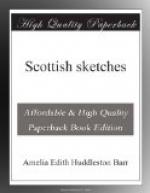“There’s nane sae weel shod, James, that they mayna slip,” answered David, with a stern face. “He has united wi’ Dr. Buchan’s kirk—there’s nane taken into that fellowship unworthily, as far as man can judge.”
“He would be a wise minister that got at all Advocate McFarlane’s sins, I am thinking.”
“Dinna say all ye think, James. They walk too fair for earth that naebody can find fault wi’.”
So James nursed the evil passion in his own heart; indeed, he had nursed it so long that he could not of himself resign it, and in all his prayers—and he did pray frequently, and often sincerely—he never named this subject to God, never once asked for his counsel or help in the matter.
Twelve years after his marriage with Christine David died, died as he had often wished to die, very suddenly. He was well at noon; at night he had put on the garments of eternal Sabbath. He had but a few moments of consciousness in which to bid farewell to his children. “Christine,” he said cheerfully, “we’ll no be lang parted, dear lassie;” and to James a few words on his affairs, and then almost with his last breath, “James, heed what I say: ’Blessed are the merciful, for they shall—obtain mercy.’”
There seemed to have been some prophetic sense in David’s parting words to his daughter, for soon after his death she began to fail rapidly. What James suffered as he saw it only those can tell who have watched their beloved slowly dying, and hoped against hope day after day and week after week. Perhaps the hardest part was the knowledge that she had never recovered the health she had previous to the terrible shock which his revelation of Donald’s guilt had been to her. He forgot his own share in the shock and threw the whole blame of her early decay on Donald. “And if she dies,” he kept saying in his angry heart, “I will make him suffer for it.”
And Christine was drawing very near to death, though even when she was confined to her room and bed James would not believe it. And it was at this time that Donald came once more to Glasgow. There was a very exciting general election for a new Parliament, and Donald stood for the Conservative party in the city of Glasgow. Nothing could have so speedily ripened James’ evil purpose. Should a forger represent his native city? Should he see the murderer of his Christine win honor upon honor, when he had but to speak and place him among thieves?
During the struggle he worked frantically to defeat him—and failed. That night he came home like a man possessed by some malicious, ungovernable spirit of hell. He would not go to Christine’s room, for he was afraid she would discover his purpose in his face, and win him from it. For now he had sworn to himself that he would only wait until the congratulatory dinner. He could get an invitation to it. All the bailies and the great men of the city would be there. The newspaper reporters would be there. His triumph would be complete. Donald would doubtless make a great speech, and after it he would say his few words.




